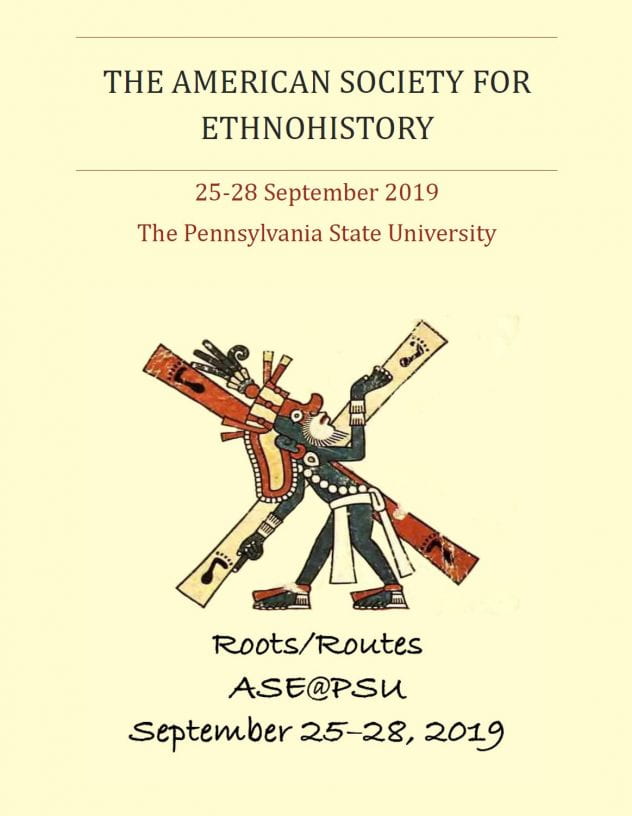ROOTS/ROUTES || PENNSYLVANIA STATE UNIVERSITY || SEPTEMBER 25-28, 2019
The American Society for Ethnohistory (ASE) is the preeminent international organization in its field. Representing multiple disciplines—cultural anthropology, history, American Indian studies, archaeology, ecology, linguistics, and related fields—the society is committed to creating a more inclusive picture of the histories of native groups.
The 2019 annual meeting will take place in State College, PA, USA on September 25-29th. The conference will be hosted by The Penn Stater Hotel and Conference Center.
Please refer to the menu pages to find more information regarding call for papers, hotel reservations, transportation, and information about State College.
"We Never Left"
Featuring Artists of Southeast Indian Tribes.
The “Discovery of the New World” unleashed centuries of disease and violence that decimated American Indian populations. But it was settler colonialism—the hunger for land that drove America’s expansion—that increasingly drove American Indians from their homelands.
For those living in the Southeast, the Indian Removal Act of 1830 was its ultimate expression, resulting in the forced removal of an estimated 65,000 to “Indian Territory” west of the Mississippi (today’s Oklahoma). As many as ten thousand people are estimated to have perished on what is now remembered as the Trail of Tears.
Removal, however, was far from complete. Estimates of Indians who remained range from as few as 4,000 to as many as 14,000—a discrepancy, scholars explain, due to who government officials counted. (A reluctance to come forward was certainly understandable.)
How did they manage to stay? By fleeing to, or already living on, inaccessible or “undesirable” land. Relying on existing state or federal treaties (usually resulting in further loss of territory). Assimilating through intermarriage and acculturation. And armed resistance.
WE NEVER LEFT celebrates contemporary artists descended from these American Indians who, against all odds, remained in the Southeast. They are members of tribes who continue to live in Alabama, Florida, Louisiana, Mississippi, North Carolina, South Carolina, and Virginia. Their highly diverse artwork addresses a variety of issues, including cultural preservation, language revitalization, personal identity and expression, community pride, and threats to homeland and the natural environment.
Description courtesy of Ruth Grim
Chief Curator and Gary R. Libby Curator of Art, Museum of Arts and Sciences at Daytona Beach
Program Committee
Cathleen Cahill, Program Committee Co-Chair, is Associate Professor of History at the Pennsylvania State University. She is a social historian with an emphasis on women’s working and political lives, asking how identities such as race, nationality, class, and age have shaped them.
Matthew Restall, Program Committee Co-Chair, is Edwin Earle Sparks Professor of History at the Pennsylvania State University. He is a historian of colonial Latin America, Yucatan and Mexico, Guatemala and Belize, Maya history, the Spanish Conquest, and Africans in Spanish America.
Martha Few is Professor of History at the Pennsylvania State University. She is a historian of Guatemala and colonial Latin America, with research interests in the history of medicine and public health, Mesoamerican ethnohistory, gender and sexuality, and human-animal studies.
Christopher Heaney is Assistant Professor of History at the Pennsylvania State University. He is a historian of modern Latin America with research interests in the history of Indigenous-European encounters over science and death in the Andes and wider Americas.
Margaret Huettl is Assistant Professor of History and Ethnic Studies at the University of Nebraska-Lincoln. Her research focuses on Native American history and North American Wests with interests in Indigenous sovereignty and settler colonialism in a transnational context.
Lucy Murphy is Professor of History at the Ohio State University, Newark. She is a historian of eighteenth- and nineteenth-century Native American history and Midwestern American borderlands history with interests in intercultural, interracial, and gender relations.
Pablo Sierra Silva is Assistant Professor of History at the University of Rochester. His research focuses on the experiences of enslaved people, mostly Africans, South Asians and their descendants, in the cities of colonial Mexico (New Spain) during the sixteenth and seventeenth centuries.
Linda Williams is Professor of Art History at the University of Puget Sound, specializing in art of sixteenth-century Mexico and Italy and the ways that art, architecture, and religious objects embodied the encounter between Yucatec Maya and Europeans in the early colonial period.
Sami Davis is a Ph.D. student in History and Art History at the Pennsylvania State University. Her research focuses on Mayan, African, and Spanish women in colonial Yucatan with a focus on the intersections of race and gender in daily lives of women.
